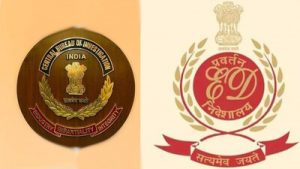Tenures Of CBI & ED Directors Extended:

The President promulgated two ordinances that would allow the Centre to extend the tenures of the directors of the Central Bureau of Investigation and the Enforcement Directorate from two years to up to five years.
- The Delhi Special Police Establishment (DSPE) Act,1946 and the Central Vigilance Commission (CVC) Act, 2003 have been amended to give the government the power to keep the two chiefs in their posts for one year after they have completed their two-year terms.
- The chiefs of the Central agencies currently have a fixed two-year tenure, but can now be given three annual extensions.
Amendments in DSPE Act:
- Provided that the period for which the Director holds the office on his initial appointment may, in public interest, on the recommendation of the Committee (the committee led by the Prime Minister and leader of Opposition and CJI as members) and for the reasons to be recorded in writing, be extended up to one year at a time.
- Provided further that no such extension shall be granted after the completion of a period of five years in total including the period mentioned in the initial appointment.
Amendments in CVC Act:
- Provided that the period for which the Director of Enforcement holds the office on his initial appointment may, in public interest, on the recommendation of the Committee (comprising of CVC chief, Revenue and Home Secretaries among others) and for the reasons to be recorded in writing, be extended up to one year at a time.
- Provided further that no such extension shall be granted after the completion of a period of five years in total including the period mentioned in the initial appointment.
Central Bureau of Investigation:
- The CBI was set up in 1963 by a resolution of the Ministry of Home Affairs.
- Now, the CBI comes under the administrative control of the Department of Personnel and Training (DoPT) of the Ministry of Personnel, Public Grievances and Pensions.
- The establishment of the CBI was recommended by the Santhanam Committee on Prevention of Corruption (1962–1964).
- The CBI is not a statutory body. It derives its powers from the DSPE Act, 1946.
- The CBI is the main investigating agency of the Central Government.
- It also provides assistance to the Central Vigilance Commission and Lokpal.
- It is also the nodal police agency in India which coordinates investigations on behalf of Interpol Member countries.
- The CBI is headed by a Director.
- The CBI has jurisdiction to investigate offences pertaining to 69 Central laws, 18 State Acts and 231 offences in the IPC.
Enforcement Directorate:
- Directorate of Enforcement is a specialized financial investigation agency under the Department of Revenue, Ministry of Finance.
- On 1st May 1956, an ‘Enforcement Unit’ was formed, in the Department of Economic Affairs, for handling Exchange Control Laws violations under Foreign Exchange Regulation Act, 1947.
- In the year 1957, this Unit was renamed as ‘Enforcement Directorate’.




